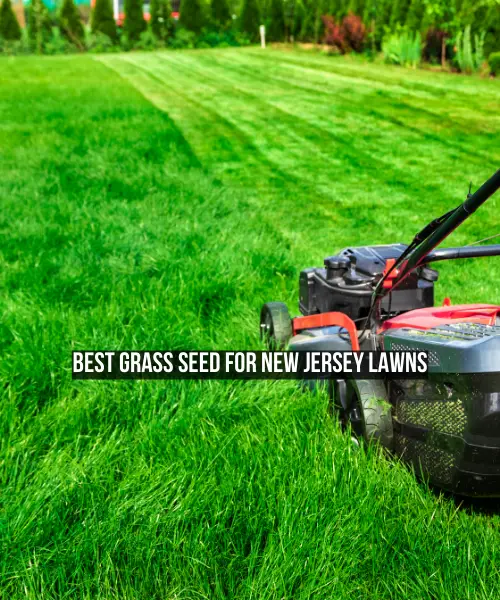Having a beautiful, lush lawn is a point of pride for many homeowners in New Jersey.
But achieving that perfect carpet of green requires starting with the right grass seed suited for the region’s climate and growing conditions.
With its hot, humid summers and cold winters, New Jersey can be a challenging environment for growing grass.
Everything you need to know about selecting the best grass seed varieties for lawns in New Jersey will be covered in this extensive guide.
We will also look at the top cool-season and warm-season grass types, their pros and cons, and what factors to consider when making your selection. Let’s dig in!
Cool-Season vs Warm-Season Grasses

Cool-Season Grasses
- Go dormant during the hot summer months
- Peak growth periods are spring and fall
- Better suited for northern climates
- Examples: Kentucky Bluegrass, Tall Fescue, and Perennial Ryegrass
Warm-Season Grasses
- Go dormant during cold winter months
- Peak growth period is hot summer
- Better suited for southern climates
- Examples: Bermuda Grass, Zoysia Grass, and St. Augustine Grass
Since New Jersey has four distinct seasons with cool spring/fall and hot summer conditions, a cool-season grass mixture is generally recommended for this region.
Top Cool-Season Grass Seed Choices for New Jersey
Kentucky Bluegrass
The classic choice for northern lawns, Kentucky Bluegrass is a beautiful dark green grass that forms a thick, dense turf when maintained properly. It has excellent cold tolerance and goes semi-dormant during summer’s heat. The downside is that it requires fairly high maintenance with regular mowing, fertilizing, and watering.
Tall Fescue
It is a tough, drought-resistant grass with deep roots that make it low-maintenance and ideal for areas with hot, dry summers. While not as lush as Kentucky Bluegrass, tall fescue has good wear tolerance and holds up well in high-traffic areas. It can struggle in heavy shade.
Perennial Ryegrass
Valued for its fast germination and establishment, perennial ryegrass is often used on new lawns or to oversee thin areas. It has a bright green color and fine texture, but lacks cold hardiness and heat tolerance compared to other cool-season varieties.
Fine Fescues
This group includes creeping red, chewing, and hard fescue grasses. Fine fescues have low fertility needs, require less mowing, and can tolerate drought and shade better than many other cool-season grasses. They form a lower-growing turf with a more bunching habit.
Recommended Cool-Season Seed Mixtures for NJ

Best Grass Seed for New Jersey Lawns
For a newly seeded lawn or renovating an existing one, most experts recommend using a premium cool-season grass seed mixture containing two or more of the above varieties. This provides genetic diversity for improved disease resistance, drought tolerance, and overall performance.
Some top-rated cool-season seed mixes for the New Jersey climate include the following:
- Jonathan Green Black Beauty Ultra
(Kentucky Bluegrass, Perennial Ryegrass, Fescues) - Pennington Smart Seed Deep Roots Sun/Shade
(Tall Fescues, Kentucky Bluegrass, Perennial Ryegrass) - Scotts Turf Builder Thick’R Lawn Sun/Shade Mix
(Tall Fescue, Fine Fescues, Kentucky Bluegrass, Perennial Rye)
Considerations for Warm-Season Grasses in NJ

While cool-season grasses are better adapted overall, there can be situations where a warm-season grass may be worth considering in parts of New Jersey.
Zoysia Grass
With its exceptional heat and drought tolerance, zoysia grass is sometimes used in southern New Jersey, where summers can get quite hot. It forms a dense, carpet-like turf when established. The main drawbacks are winter dormancy, poor shade tolerance, and very slow establishment from seed/plugs.
Bermuda Grass
A finer-bladed warm-season similar to zoysia that also excels in heat and drought. Bermuda is rarely used for home lawns in New Jersey due to its winter dormancy, but can be found on some golf courses and sports fields in the southern part of the state.
If planting warm-season grass in New Jersey, follow the transition zone seeding schedule of late spring/early summer. The growing season may be too short for adequate establishment from seed, so vegetative planting of sod, plugs, or sprigs is generally recommended instead.
Other Factors to Consider for Grass Seed Selection

Shade Tolerance
How much shade does your lawn get? Too much shade favors shade-tolerant fescues over sun-loving varieties like Kentucky bluegrass. Evaluate your site conditions.
Usage and Traffic
For high-traffic areas like play areas, more wear-tolerant and resilient grasses like tall fescue perform better than rye. Lower-growing fine fescues work well for low-maintenance areas.
Soil Type
Some grasses prefer sandier, well-drained soils, while others do better in heavier clay soils. Amending soil based on a soil test analysis is ideal before seeding.
Maintenance
Certain cool-season grasses, like Kentucky bluegrass and perennial rye, require more intensive maintenance like dethatching, aerating, fertilizing, and watering. Consider your time and resource commitment.
Desired Look
Fine fescues have a more delicate, natural appearance, while other grasses give a more formal, manicured look. Think about your ideal aesthetic.
By considering these factors, you can narrow down the best cool-season (or warm-season) grass seed choices for your New Jersey lawn’s unique conditions and desired outcome.
When to Plant Grass Seed in New Jersey
Cool-season grasses can be planted in both spring (April–May) and fall (August–September) in the New Jersey climate. Fall is generally considered the most ideal time, as the combination of warm soil, cool air temperatures, and autumn rain showers creates excellent growing conditions for cool-season grass establishment before winter arrives.
Spring seeding runs a greater risk of hot summer pressure impacting new grass development. But with proper site prep, soil amendments, and attentive watering, you can still get a nice new lawn started in spring.
For warm-season varieties, late spring (May–June) is the best time to plant to give seeds or sod pieces enough time to get established before the peak summer heat arrives.
No matter what type of grass you choose, following proper seeding fundamentals of soil testing, tilling, raking, and amending the soil as needed will set your new lawn up for success.
Lawn Maintenance Tips for New Jersey
The adage “right plant, right place” definitely applies to having a healthy lawn in New Jersey. While choosing regionally-adapted grass seed is important, proper long-term maintenance is just as critical.
Some key lawn care practices for the NJ climate include:
- Adjusting mowing heights for different seasons (higher in summer heat)
- Aerating compacted soil annually to improve drainage and rooting
- Applying pre-emergent herbicides in spring and fall for weed control
- Fertilizing with appropriate cool-season fertilizers per soil test recommendations
- Responsible for watering during dry spells, taking care to over-water
- Dethatching to remove excessive dead organic matter
- Overseeding bare/thin areas to maintain turf density
Cool-season grass lawns in New Jersey will benefit from the bulk of maintenance occurring in spring and fall when temperatures are moderate. During hot summer months, it’s advisable to avoid excess foot traffic and allow the grass to go semi-dormant rather than pushing excessive growth.
Conclusion
Creating a great lawn in New Jersey starts with selecting high-quality cool-season grass seeds well-suited to the region’s climate. While Kentucky bluegrass remains a popular classic option, today’s homeowners also have many improved tall and fine fescue and perennial rye varieties to consider.
Whether planting from seed or sod, site evaluation, proper timing, and ongoing seasonal maintenance will ensure your new lawn stays thick, healthy, and beautiful for many seasons to come. With some initial research and care, you can be the envy of the neighborhood with a green grass masterpiece surrounding your New Jersey home.




